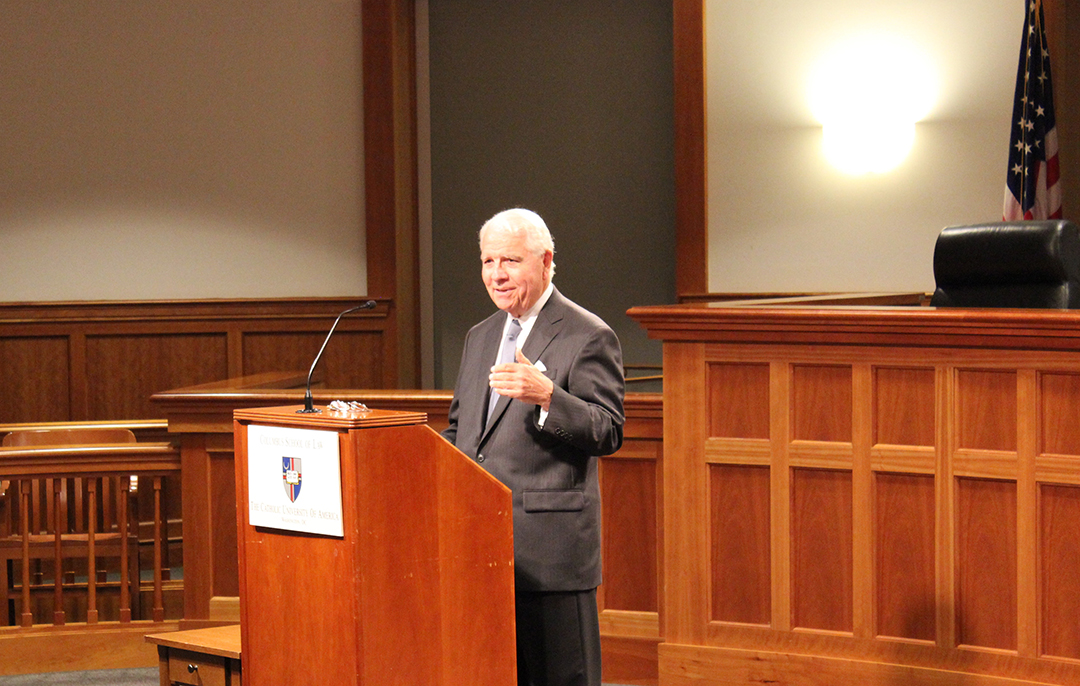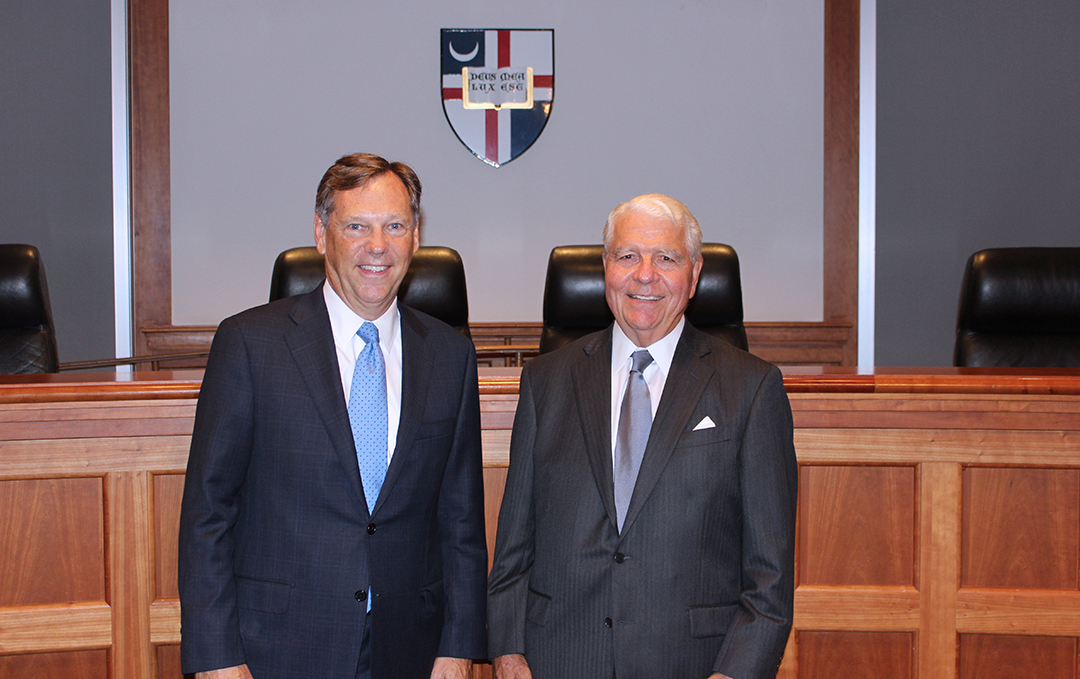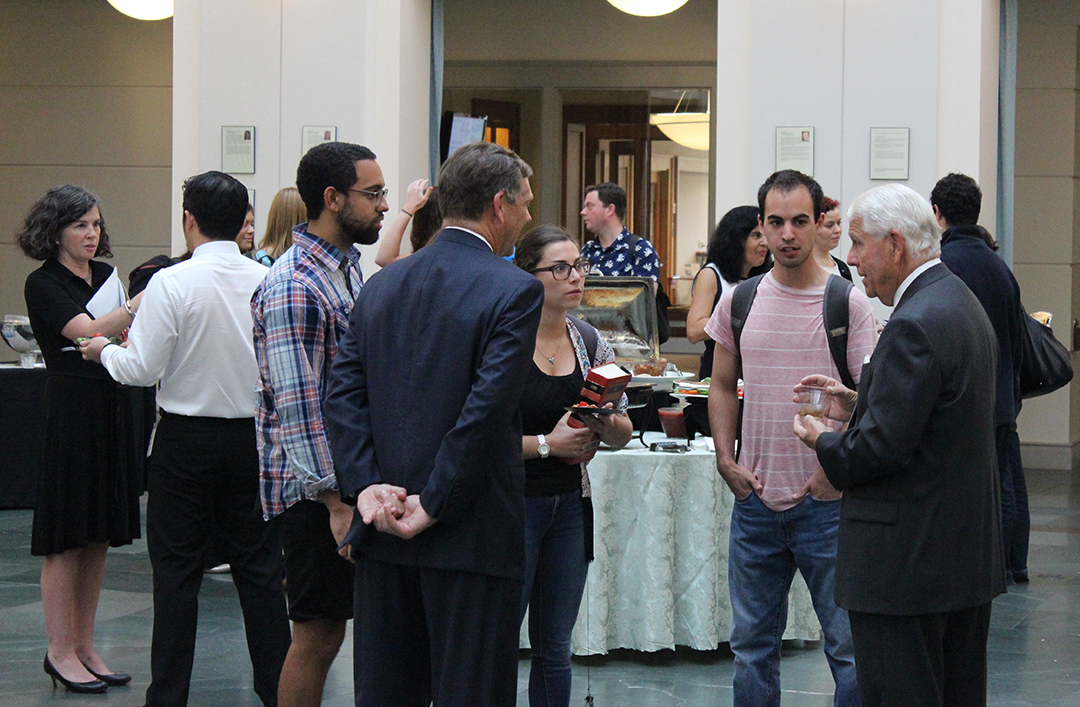
by Richard Kisielowski, 3L at the Columbus School of Law
Fittingly, on the eve of the 14th anniversary of the September 11 terrorist attacks on the United States, Judge Thomas F. Hogan was the most recent lecturer of the Brendan F. Brown Lecture Series at CUA Law. Judge Hogan is Senior Judge for the U.S. District Court for the District of Columbia as well as the currently Presiding Judge of the United States Foreign Intelligence Surveillance Court (more commonly referred to as the FISA Court). Authorized under the Foreign Intelligence Surveillance Act of 1978, FISA Court oversees requests for surveillance warrants against foreign spies, enemies, and terrorists within the United States by federal law enforcement and intelligence agencies.
Judge Hogan described the specialized work of FISA Court as well as the considerations that he and his fellow FISA judges routinely face while deliberating these highly sensitive cases. When issues of national security are on the line, a delicate balance must be achieved to ensure that civil rights, privacy, and religious interests of Americans are preserved-all while properly pursuing perpetrators. Judge Hogan said, "these cases impact us more today than ever before…[and] no longer are confined to law review articles."
He reflected on actions allowed by past courts during times of war and concluded that courts may interpret the law differently in wartimes compared to times of peace. He noted that a particularly dark period in American Legal History was the upholding of laws allowing Internment Camps during World War II. America has been placed back on a war-footing in the wake of September 11, 2001, he remarked. He specifically cautioned the prolonged adjudication of Guantanamo detainees could become another troubling period in our Legal History.
While America continues to combat the ongoing War Against Terror, FISA Court remains highly structured and impartial, requiring extensive proof and intense processing before authorizing surveillance by various Federal entities. Judge Hogan noted the particular importance of impartiality of judges when reviewing allegations and threats by would-be terrorists and enemies, regardless of possibly conflicting personal and political stances. He emphasized that no other nation requires independent judicial body to rule on cases before allowing surveillance of suspects.
Judge Hogan concluded that issues regarding the balance of civil liberties and national security continue to arise and will ultimately fall to the next generation of lawyers to grapple in the future.
Before wrapping up his lecture and after taking a few questions, Dean Daniel F. Attridge asked one final question-What was one key take away for CUA Law students as they enter this profession? "The importance of candor with the Court," Judge Hogan responded. He elaborated how candor with a court impacts a lawyer's valuable reputation and integrity with the profession and amongst colleagues.
Judge Hogan was appointed to the United States District Court for the District of Columbia in August 1982, became Chief Judge on June 19, 2001, and assumed Senior Status in 2008. He served as Chair of the Executive Committee of the U.S. Judicial Conference, Chair of the Courtroom Technology Subcommittee, and served on the Board of the Federal Judicial Center.
Judge Hogan graduated from Georgetown University, receiving an A.B. (classical) in 1960. He attended George Washington University's master's program in American and English literature from 1960 to 1962, and he graduated from the Georgetown University Law Center in 1966, where he was the St. Thomas Moore Fellow.


Pictured above from L to R: Dean Daniel F. Attridge, Judge Thomas F. Hogan

